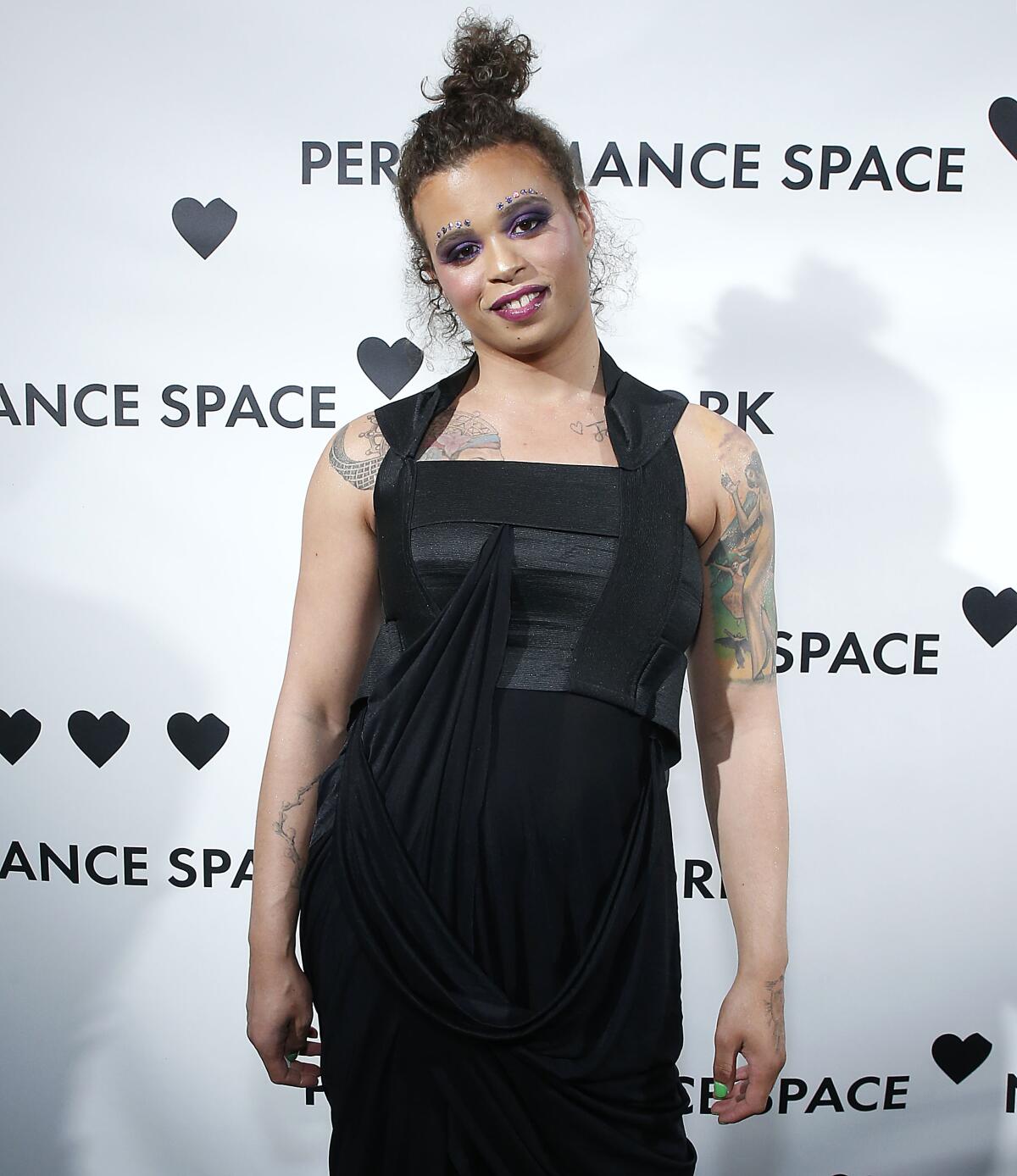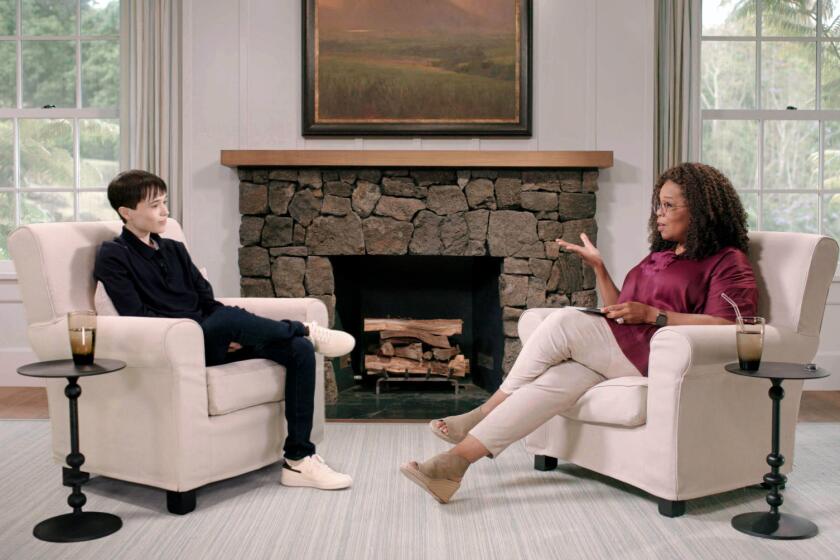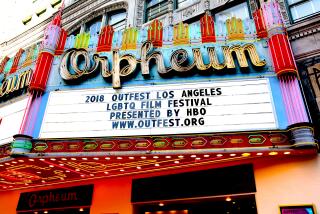‘Visibility is no longer enough’: At Outfest, trans and nonbinary creators ponder what’s next

- Share via
This weekend, as Outfest LA closes out its 39th year with a performance by queer and Filipina American-led band Fanny and an Achievement Award presented to trailblazing actor and filmmaker Elliot Page Sunday night at the Orpheum, the festival’s trans and nonbinary summit marks a milestone of its own.
Taking place on Saturday at 1:30 p.m. live and in person at the Directors Guild of America, the summit celebrates its fifth year running as part of one of the biggest and buzziest LGBTQ+ festivals in the world. This year’s daylong program of talks, short films and events grows out of the event’s simple overarching mission, says lead programmer Kieran Medina: “To be a space that centers trans and nonbinary creators from beginning to end.”
In a festival held over 10 days across Los Angeles showcasing nearly 200 genre-spanning films from all over the world and representing a vibrant spectrum of the LGBTQ+ experience, the summit is an intentional effort to distinguish stories about trans and nonbinary lives from those told by trans and binary storytellers.
“There are shorts that come into the festival that are trans stories, but they’re not directed or produced or written by a trans person, and that’s OK,” said Medina, who has led the summit for the past three years. “I wanted it to be a space where everything that we are showcasing and uplifting is created by a trans person, whether it’s written by, directed by or produced by. I wanted to showcase that there are people in our community telling these stories.”
This year’s summit theme is “CommUNITY,” and it kicks off with a keynote speech by artist, filmmaker and activist Tourmaline (“Happy Birthday, Marsha!”), named one of Time Magazine’s 100 Most Influential People of 2020, whose work highlights and preserves the world-changing legacies of Black queer and trans people. (Portions of the summit will be made available online via Outfest.)
A short film showcase will screen four titles (“Love You Forever” by Sepand Mashiahof and Sepehr Mashiahof; “F1-100” by Emory Chao Johnson; “Ni Aquí / Ni Allá” by Ley Comas; and “Little Sky” by Jess X. Snow) along themes common to trans narratives, with filmmakers in attendance to discuss their work and perspectives as emerging artists.
Emmy-nominated artist and filmmaker Zackary Drucker (“This Is Me,” “Transparent”), who made her longform directorial debut earlier this year with the HBO documentary series “The Lady and the Dale” and serves on the Outfest board, returns to the festival she credits with fostering her development as an artist and subsequent leap from the experimental art world to a film and television career.
“I always appreciate conversations that can happen in a space where folks don’t need to define things or explain things, and I think that’s truly where the more advanced work we do as a community can happen,” said Drucker, who will appear alongside Our Lady J, Nava Mau, D’Lo and River Gallo on the “Post-’POSE’: The Future of Trans & Nonbinary Storytelling” panel, moderated by Jacob Tobia, to discuss the impact of the groundbreaking Emmy-winning series and what the future holds for trans and nonbinary narratives.

What comes next — after awards-garnering hits like “Pose” and “Transparent” and other watershed moments have moved the needle for mainstream representations of trans and nonbinary experiences — is a question both established and rising creatives are asking as the industry embraces more queer film and TV characters and voices.
As with other marginalized communities who have broken through in Hollywood to varying degrees in recent years, it’s no longer a matter of simply making it onto the screen, but the degree to which inclusion is authentically informed and authored.
“Over the past several years we’ve been creating a new template and a new standard of allowing gender-expansive characters to have dignity and complexity, and I feel as though we’re entering an era where we can be fully human, be flawed and layered and many things to many people — where we’re allowed to be as complex as any other characters,” said Drucker, who is working on her next two directorial feature projects. “The trans characters that I’m interested in are flawed and not always good role models but are inspiring people in their perseverance nonetheless.”
Outfest’s trans and nonbinary summit was created in 2017 as a response to the moment, said Medina, a few years after “Transparent” hit the air and Laverne Cox made history on the cover of Time. “There were a lot of conversations around, ‘Should cis actors be playing trans roles?’ Everyone wanted to tell trans stories but no one wanted to bring trans people into the room or for trans actors to play the role.”
Events like the Outfest summit that gather creatives in the community are necessary, says filmmaker Rain Valdez, because while doors have opened since its first iteration, the industry is still far behind when it comes to treating trans and nonbinary talent equally. “We’re still not at the place where we would like to be in terms of equality and pay equity and diversity,” she said. “But onscreen visibility is no longer enough.”
Last year, Valdez was nominated for an Emmy for her performance in “Razor Tongue,” a webseries she wrote, created and stars in as Belle Jonas, a woman navigating love and call-out culture in L.A. Debuting in 2019 and made possible by crowdfunding support, “Razor Tongue” was created in response to the lack of opportunities Valdez faced, often in projects featuring one-dimensional trans characters not written by trans creators, whose gender identities existed solely to serve as reductive plot points.
Jared Leto won an Oscar for it. Jeffrey Tambor won two Emmys and a Golden Globe for it.
“I wasn’t getting the kind of roles that I knew I was capable of at the time, or the kind of roles that I was interested in playing,” Valdez said. “I got to a point where I thought, ‘You know what? I’m just going to write it for myself.’ I’ve come to the conclusion that if we want space in this world and in this industry, we have to create it for ourselves.”
To close out the 2021 summit, Valdez and Bowie Starr will co-produce a live table read of episodes from the already-written second season of “Razor Tongue,” joined by a cast of trans and nonbinary actors including Tobia, Alexandra Grey, Sterling Jones, Trace Lysette, Scott Turner Schofield, Rachel Leyco, Candis Cayne and Angelica Ross.
But the questions Valdez has for her industry peers have more to do with long-term sustainability, now that more trans and nonbinary creatives have their feet in the door: “How do you create built-in reinforcements so that we continue to tell stories from our unique perspectives? If you think of the revolution in phases, we’re no longer in a Trans 101 classroom. We’re no longer in Phase One. We need to move on to the next phases of our creativity.”
Drucker too is thinking in terms of moving beyond already established benchmarks and feels a palpable momentum, following the social justice movements of 2020, for the industry to create pipelines of opportunity for a broader spectrum of voices.
“I think that we have our sea legs. There are now folks in the community who have clout in the industry, who have agents, who are working on multiple projects, and we’re really ready to kick into what the next phase is,” she said. “I think that the entertainment industry is primed for experimentation and expansion.”
Elliot Page sits with Oprah Winfrey on “The Oprah Conversation” for his first on-camera interview since revealing his gender transition in December.
Outfest 2021 may be striving for a celebratory note in spite of the ongoing pandemic, as it fosters calls to action from artists working today. But it also arrives in a year marked by a historic wave of anti-trans legislation at the state level, one that’s also on track to become the deadliest year for trans and gender-nonconforming people, according to the Human Rights Campaign.
That’s partly why Medina feels the gravity and emotion of this year’s Outfest, where on Sunday they will bestow Page with the festival’s Achievement Award honors less than a year after the “Juno” and “Umbrella Academy” star publicly came out as trans.
“He has always been a part of our community and will always be a part of our community, and I want to remind him of that,” Medina said. “He’s someone who was extremely brave and decided to come out and use his platform when he didn’t need to. ... I want to take that as an opportunity to thank him and also remind him that there is a whole community here who welcomes him and supports him, and who will be here regardless of how his journey will unfold.”
More to Read
Only good movies
Get the Indie Focus newsletter, Mark Olsen's weekly guide to the world of cinema.
You may occasionally receive promotional content from the Los Angeles Times.












